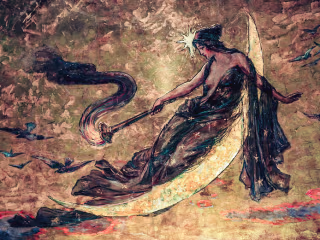Tyche: Goddess of Fortune and Chance
0
Ghostwriter
Blog Writer
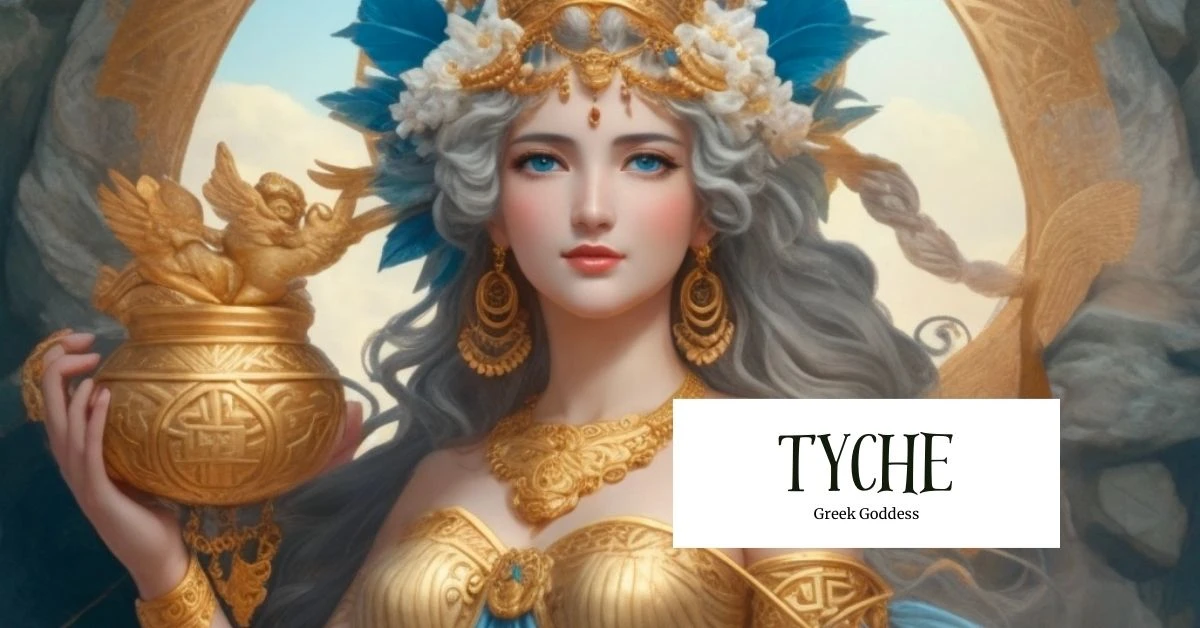
The Goddess Tyche has long been admired for her captivating allure and association with fortune and chance. Throughout history, she has captured the hearts and minds of countless individuals, with her charisma transcending time and place. Tyche’s many titles are significant in the pantheon of deities, representing her influence over fortune, prosperity, and destiny. This comprehensive exploration of Tyche’s multifaceted nature aims to delve into her extraordinary abilities, ethereal characteristics, elusive traits, and profound symbolism. As we examine the sacred rites and festivals dedicated to honoring this venerable goddess, we showcase her indomitable influence on human culture and our existence. By delving deeper into Tyche’s legend’s intricacies, we can better understand her role in shaping Greek mythology.
Overview of Tyche
The deity known as Tyche, or Tykhe, holds a significant place in Greek mythology and the Greek language. Known as Fortuna to the Romans. Her name, derived from the Greek word “τύχη,” translates directly to “luck” or “chance” (Atsma). This linguistic connection emphasizes her fundamental role as the embodiment of these concepts and underscores that her name is not just a label but a direct reflection of her essence. As the living embodiment of fate’s erratic and unpredictable nature, she profoundly influences the destinies of mortal and immortal beings (Cartwright). Her enigmatic presence weaves through the narratives of countless myths, beliefs, and rituals across the ancient world. Whether celebrated under the name Tyche or Tykhe, her essence remains unwavering, leaving an indelible mark on the collective consciousness of humanity.
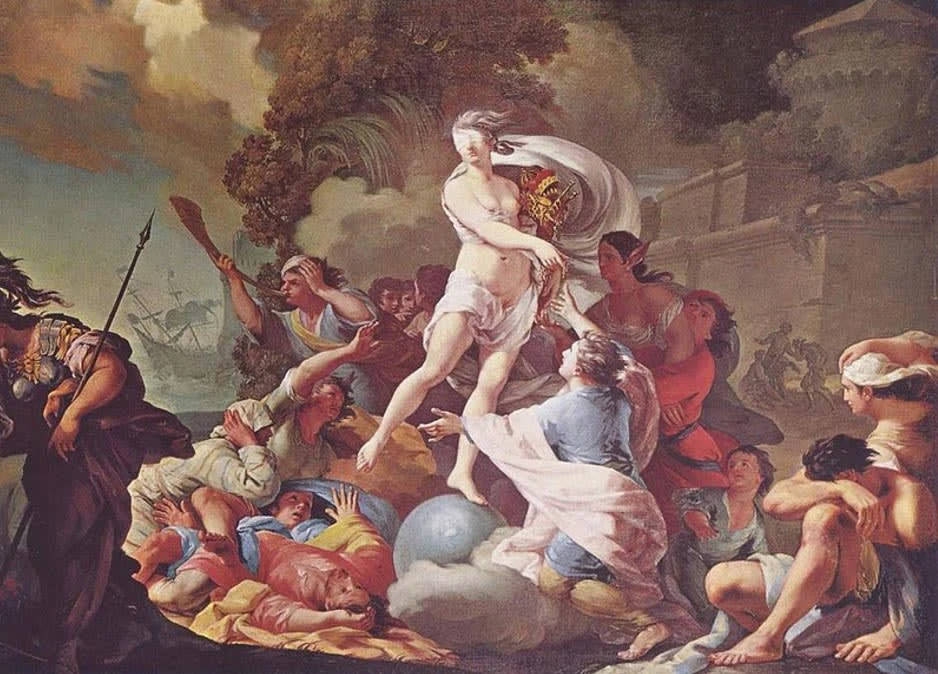
Source: Ancient Origins
Titles
Goddess of Fortune
Lady Luck
Goddess of Prosperity
Bearer of Fate
Abilities
Tyche’s powers extend across the spectrum of fate and fortune. She is revered and feared for her extraordinary ability to bestow good or bad luck upon individuals, which can significantly mold their lives (Cartwright). Moreover, Tyche can alter destinies, transcending the boundaries of mortal and immortal realms (Wikipedia Contributors). This ability underscores her pivotal role as a force that shapes existence itself. She reigns supreme in chance, influencing the outcomes of games, competitions, and critical decisions. Tyche becomes irrefutable in such moments, guiding fate’s hand in unpredictable ways.
Furthermore, Tyche’s domain extends to the realm of prosperity, where she emerges as the benevolent bestower of abundance, wealth, and success upon communities and individuals alike. Her blessings bring forth the fruits of affluence, enriching the lives of those fortunate enough to receive her favor. Tyche’s protective gaze extends to the heart of cities, where she stands as a guardian, shielding them from harm and ensuring their continued growth and prosperity (Atsma).
Characteristics
The goddess Tyche emerges as a fascinating and beguiling figure in ancient mythology. Consistently portrayed in various depictions as the embodiment of beauty and charm, Tyche is adorned in flowing robes that sway like the gentle wind (Cartwright). Her physical presence exudes an aura of elegance and poise, reflecting her esteemed position among the pantheon of divine beings. As a goddess intrinsically linked to the concepts of fortune and grace, her appearance radiates an otherworldly beauty that transcends the mortal realm. Her bearing, marked by an unshakable air of confidence and innate serenity, symbolizes the calm before the storm (“Artemis in Greek Mythology”).
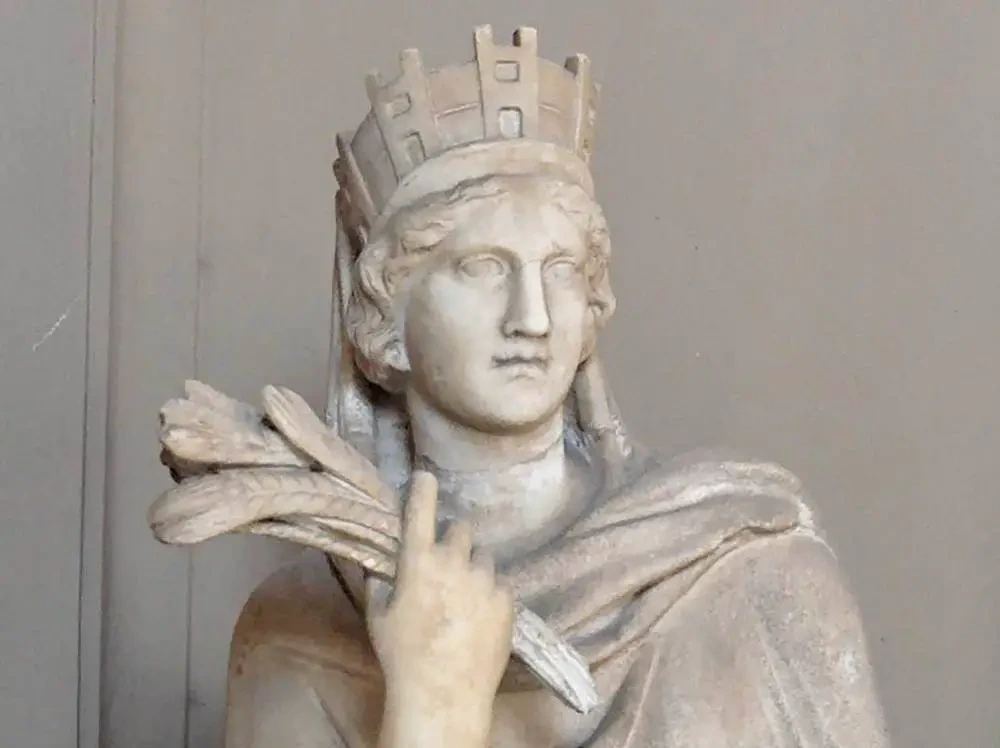
Source: Greek Mythology
Traits
Beyond Tyche’s alluring physical attributes, her personality traits delineate her enigmatic role within the intricate narrative of Greek mythology. She was widely recognized for her capricious nature, which embodies the unpredictable essence of fortune and luck (Wikipedia Contributors). Her whims have the potential to elevate individuals to the pinnacle of success or plunge them into the depths of misfortune, keeping both mortals and immortals alike in a constant state of uncertainty. Despite her influence, Tyche remains shrouded in an impenetrable veil of mystery and intrigue, as her actions often elude mortal understanding. Her presence lends her an air of mystique and perpetuates her relevance throughout the ebb and flow of time.
One of Tyche’s most distinguishing characteristics is her dispassionate indifference. Unlike many other deities, she neither favors nor discriminates against any particular being, exemplifying a stance of impartiality in the grand scheme of existence (“Artemis in Greek Mythology”). Yet, behind her seemingly detached facade lies an undeniable power capable of shaping the destinies of gods and mortals alike. Tyche’s hand guides the course of events, steering the wheel of fortune with unparalleled finesse.
Lastly, Tyche’s adaptability is a testament to the fluid nature of fortune and fate. She embraces change and transformation, mirroring the ever-shifting currents of existence. This adaptability allows her to remain significant throughout the ages, forever attuned to the mutable whims of fortune and the relentless march of destiny.
Symbols
Tyche is characterized by a rich array of symbols: the Cornucopia, overflowing with abundance and prosperity, epitomizes her benevolent aspect, symbolizing the blessings she bestows upon those under her favor. The Wheel of Fortune, which turns ceaselessly in her hand, embodies the unpredictable nature of luck and the ever-fluctuating tides of fate (“Artemis in Greek Mythology”). Its perpetual motion is a potent visual metaphor for the capriciousness of life’s twists and turns.
Additionally, the Ship’s Rudder underscores Tyche’s ability to guide and steer the course of events, providing a sense of direction in the turbulent seas of existence (Wikipedia Contributors). It represents her subtle yet influential presence in the lives of individuals and communities, ensuring they navigate life’s challenges with a measure of guidance and protection.
Lastly, the depiction of Tyche with wings emphasizes her swift and elusive nature (Atsma). Like a gust of wind that can alter one’s fortunes instantly, her wings accentuate her capacity to bestow either favor or misfortune swiftly.
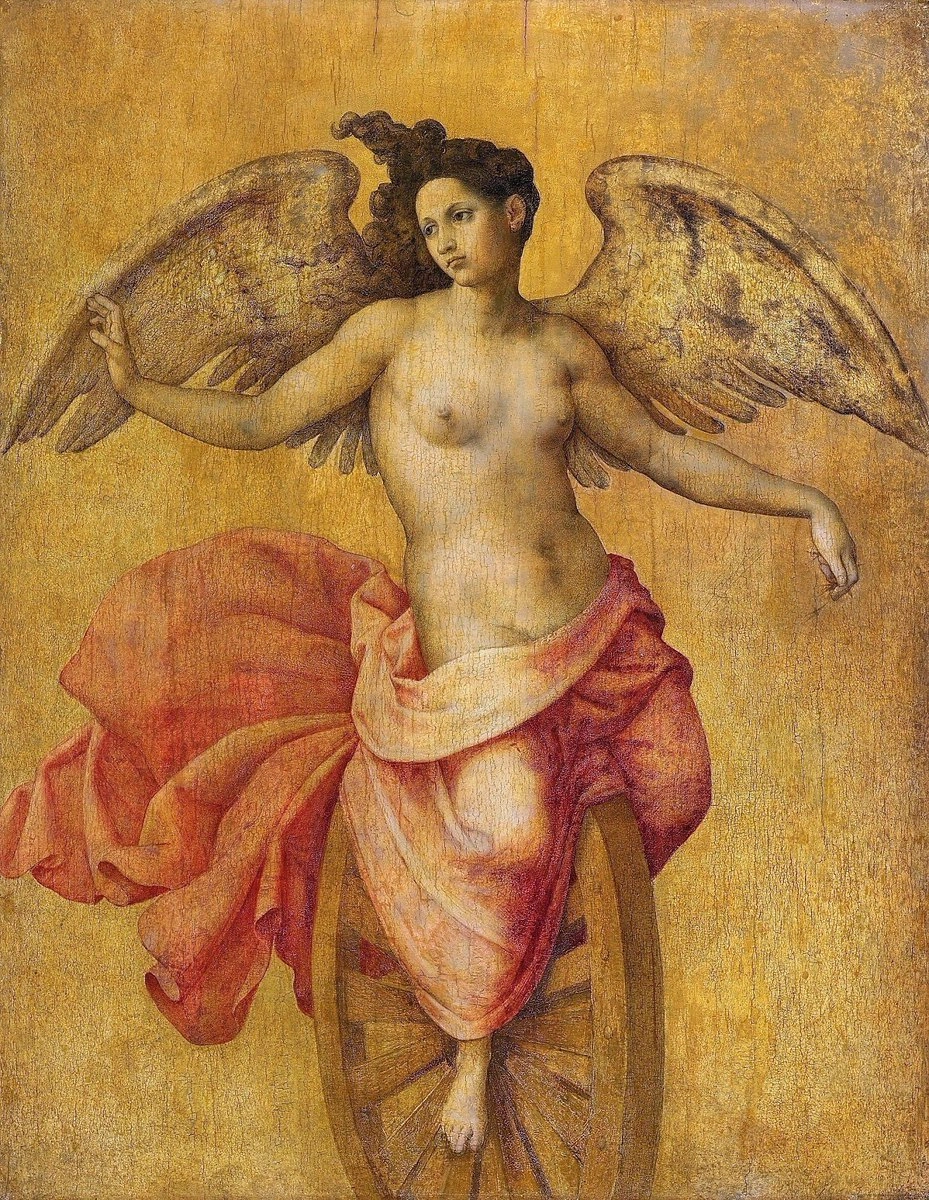
Source: X
Festivals and Rituals
The worship of Tyche, the goddess of fortune and chance, was a significant aspect of the spiritual life in ancient Greece (Atsma). Tyche’s Feast, an extravagant event marked by lavish banquets, games of chance, and offerings to the goddess, was among the most captivating celebrations. This grand gathering allowed adherents to revel in the wild nature of Tyche while seeking her blessings. The Feast symbolized the abundance and prosperity she could bestow upon her favored devotees, while games of chance mirrored the unpredictability of her influence.
Devotees also turned to devotion and prayers to seek insights into their future endeavors, trusting Tyche’s ability to influence life events (Wikipedia Contributors). Theatrical performances dedicated to Tyche enriched the spiritual tapestry of ancient Greece, showcasing the goddess’s role in shaping the characters’ lives and the outcomes of their actions. Additionally, statue processions emerged as a compelling means of invoking Tyche’s protection and favor upon Greek cities. The parades resonated with an unwavering faith in the goddess’s enduring influence, fostering a sense of unity and devotion among the community (Atsma).
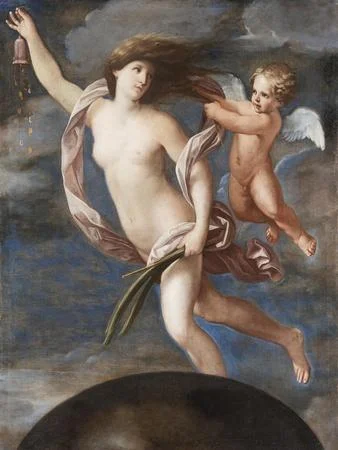
Source: Meisterdrucke
Legends associated with Tyche
Tyche, the goddess of fortune and chance, has fascinated the minds of many throughout the ages. While she is primarily associated with the broader themes of luck, fortune, and chance, few legends focus solely on her character and deeds in Greek mythology. Instead, her role often lies in the background, as she influences the outcomes of events rather than being the central figure of a specific narrative. The tales associated with Tyche, rich with legend and steeped in lore, offer profound insights into her origins, characteristics, and the extent of her influence. This section takes us through these enchanting legends, unraveling the stories contributing to her enduring mystique.
Origin story
Tyche’s origin can be traced back to the primordial era, wherein she emerged from the divine union of two ancient sea deities, Oceanus and Tethys (based on classical Greek mythology). This celestial parentage situates her among the earliest generations of divine beings in Greek cosmogony (Atsma). The union of Oceanus and Tethys represents the cosmic forces of the vast and uncharted sea, which held profound significance in Greek mythology. Tyche’s birth from these primordial deities symbolizes her connection to the fundamental elements of the universe, especially the unpredictable and ever-changing nature of water, mirroring the unpredictable course of luck and fortune.
As the embodiment of chance, Tyche occupied a unique and influential role in the Greek deities’ pantheon. Her divine lineage granted her the power to shape destinies, granting favor to some while subjecting others to the capricious turns of fortune (Cartwright). This innate ability positioned her as a figure of immense significance, holding sway over both mortals and immortals’ lives.
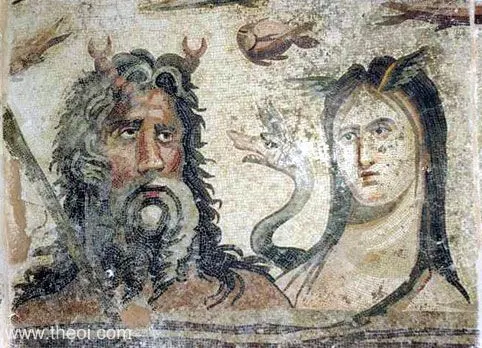
Source: Theoi Greek Mythology
The Miraculous Intervention of Tyche
The legend of Tyche is deeply ingrained in the cultural consciousness of ancient Antioch, and it highlights the belief in the goddess’s benevolence and the power of divine intervention (Cartwright). During the reign of the Roman Emperor Trajan, the city was struck by a devastating famine, which threatened the very survival of its inhabitants. In response, the citizens turned to Tyche, the goddess of fortune and chance, hoping to receive her divine favor.
With remarkable devotion, the people of Antioch organized a grand procession through the city’s streets, with the statue of Tyche at the center of their plea for relief (Wikipedia Contributors). This procession was a testament to the power of faith and the belief in Tyche’s ability to influence the course of human affairs. Miraculously, the famine that had plagued Antioch for so long ended shortly after the parade. The city’s people attributed their salvation to Tyche’s benevolence and divine intervention, cementing her status as a guardian and bestower of fortune in their collective consciousness.
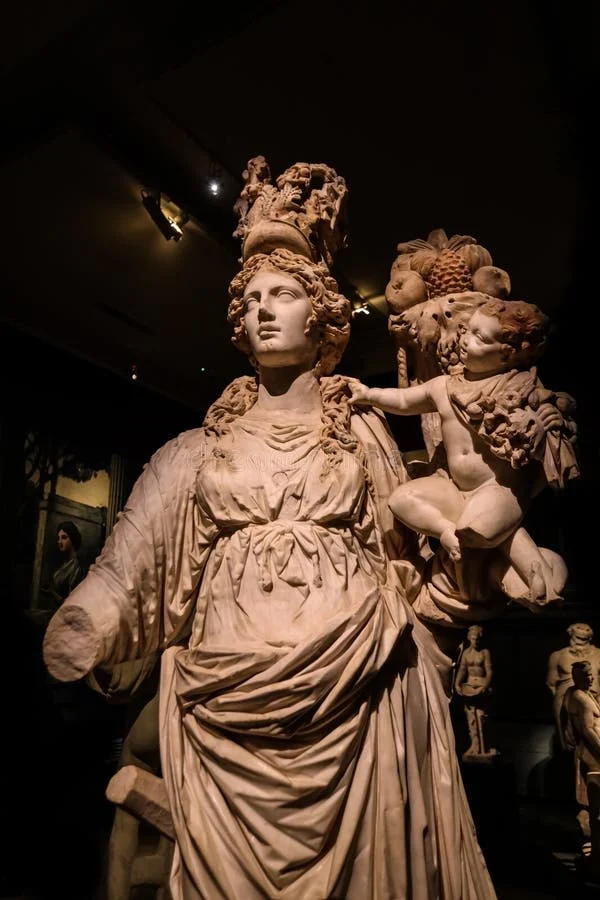
Source: Dreamstime
Seeking Prosperity During Turmoil
Another captivating legend associated with Tyche unfolds in the ancient city of Alexandria. This tale underscores her role as a deity capable of bringing harmony and prosperity during turmoil (Wikipedia). The city of Alexandria, known for its historical significance and vibrant culture, faced a period of political unrest and instability. In the face of these tumultuous circumstances, the citizens turned to Tyche, recognizing her as a potent force capable of restoring order and serenity to their lives.
To beseech the goddess’s intervention, the people of Alexandria organized a grand festival in her honor. This festival included offering sacrifices and participating in games dedicated to Tyche. It was a heartfelt expression of their faith in her ability to improve their lives and the city’s affairs. According to the beliefs of the time, Tyche’s divine influence played a pivotal role in calming the unrest that had gripped Alexandria. As a result of this collective devotion and the festival held in her name, Alexandria experienced a period of relative peace and prosperity. This legend is a testament to the enduring belief in Tyche’s capacity to influence events and shape the destinies of those who invoke her name. It reaffirms her status as a goddess of fortune and restoring harmony during times of adversity.

Source: Tyche + Iset Eyewear
Influences of other religions/cultures on Tyche
The deity Tyche, known for representing fortune, luck, and chance in ancient Greek mythology, has a rich history extending beyond Hellenistic beliefs’ boundaries. Tyche’s influence can be observed in various cultural and religious contexts, as demonstrated in the assimilation of Greek and Egyptian ideas during Hellenistic times (Cartwright). This assimilation led to equating Tyche with the Egyptian goddess Isis , showcasing her adaptability and enduring appeal across different belief systems.
It is worth noting that Tyche’s origins can be traced back to the early Greek religious traditions, and she was an established deity in Greek culture long before the Hellenistic era. However, equating Tyche with Isis occurred during the Hellenistic period, when Greek and Egyptian cultures interacted and influenced one another. This syncretism, which identified deities from different cultures with one another, was a common practice in the Hellenistic world. It allowed for blending religious beliefs and recognizing common attributes between gods and goddesses from various pantheons.
Modern appearances
The influence of Tyche, the Greek goddess of fortune and chance, continues to endure in various facets of modern popular culture (Atsma). Tyche remains a powerful symbol of luck and opportunity in businesses, casinos, and games of chance. Her legacy captivates the human imagination, serving as a testament to the enduring fascination with the enigmatic forces that shape human destinies. The concept of “Lady Luck,” an iconic figure in gambling and gaming, epitomizes Tyche’s archetype. This personification of fortune embodies the capriciousness of luck, reflecting Tyche’s essence as a goddess who can bestow blessings and challenges. Lady Luck is ubiquitous, reminding those who pursue chance and risk that they may encounter the whims of Tyche herself.
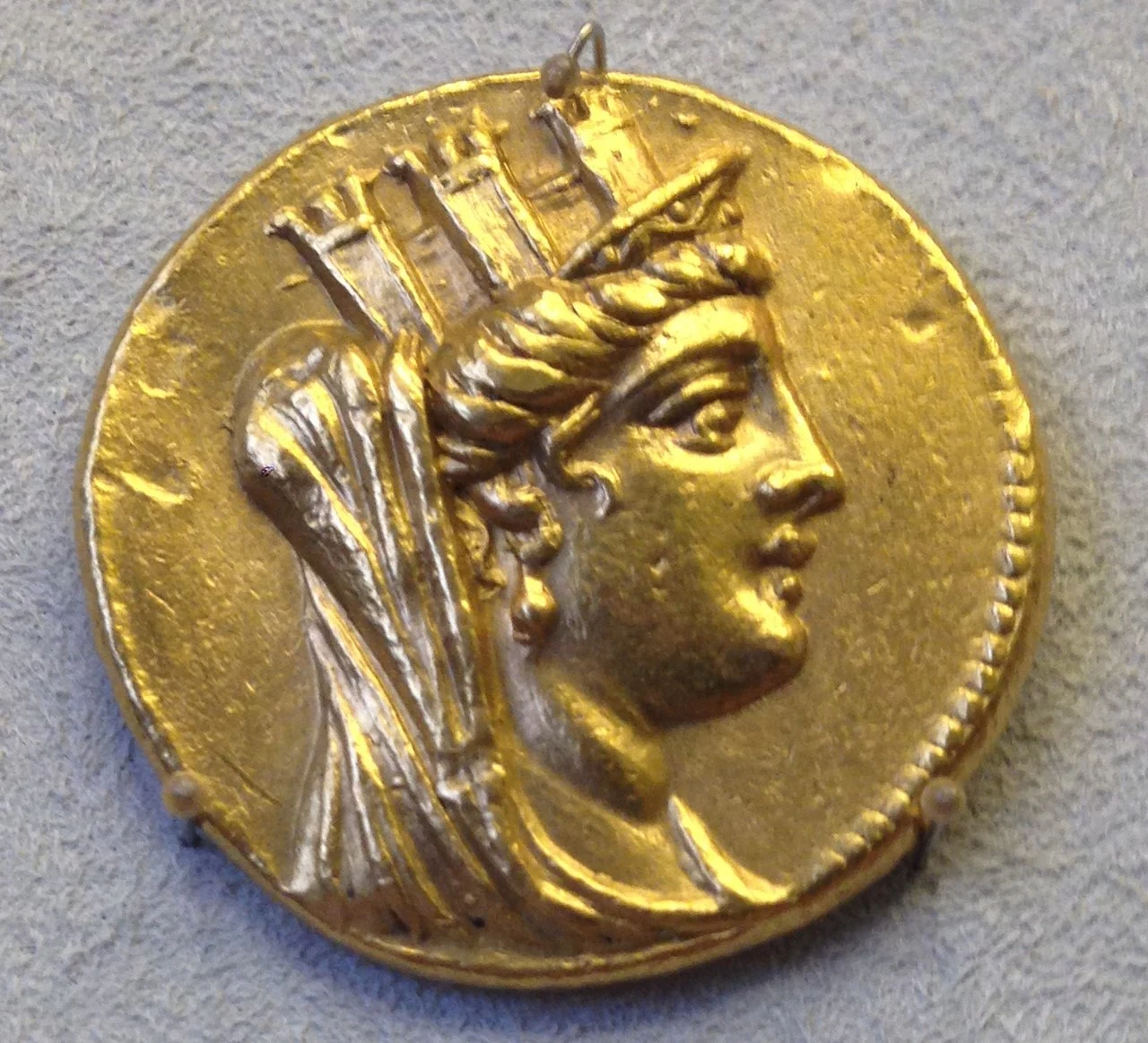
Source: World History Encyclopedia
Final thoughts
Tyche’s presence in Greek mythology and beyond is a testament to the enduring power of belief and the eternal allure of the capriciousness of fate. Her enigmatic character continues to fascinate, reminding us of the ever-present, unpredictable forces that shape our lives and the human desire to seek favor in the realm of luck and success. With her origin story, legends of divine intervention, and adaptability in the face of cultural influences, Tyche remains an enduring figure.
References
“Artemis in Greek Mythology.” Study.com, 2022, study.com/learn/lesson/artemis-goddess-greek-mythology.html.
Atsma, Aaron J. “ARTEMIS – Greek Goddess of Hunting & Wild Animals.” Theoi Greek Mythology, Theoi Project, 2000, www.theoi.com/Olympios/Artemis.html.
Cartwright, Mark. “Artemis.” World History Encyclopedia, Mark Cartwright, 24 July 2019, www.worldhistory.org/artemis/.
Wikipedia Contributors. “Artemis.” Wikipedia, Wikimedia Foundation, 13 Dec. 2018, en.wikipedia.org/wiki/Artemis.
Did we miss something? Do you know another aspect of this legend? Don't hesitate to reach out!

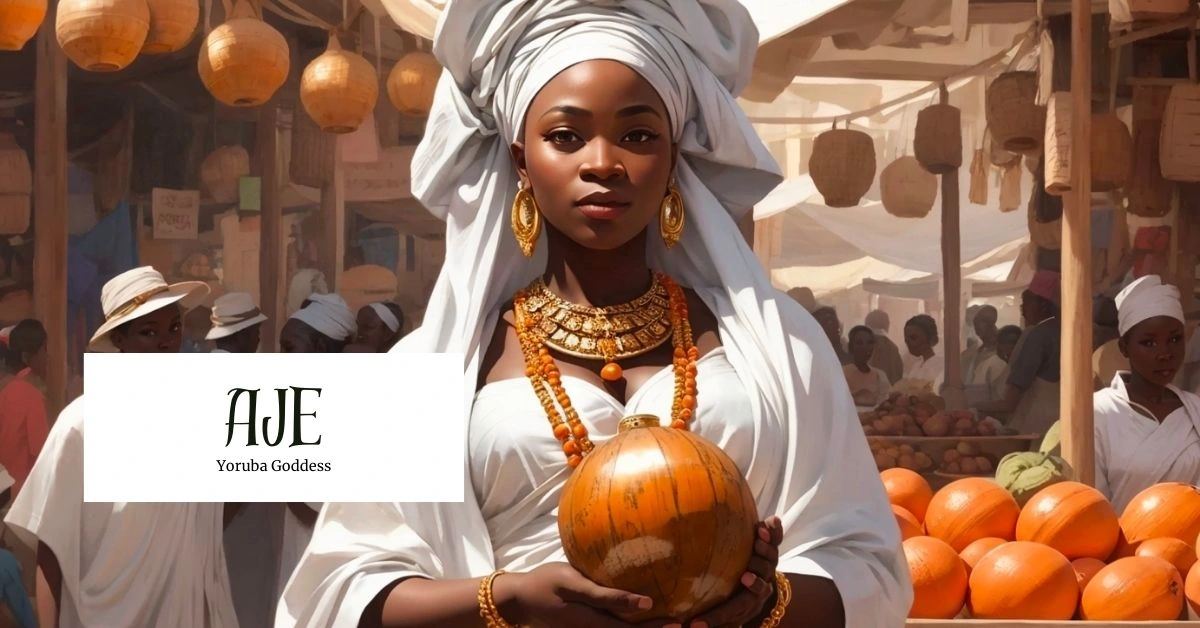
Like this project
0
A client hired me to write several informative pieces on Greek Goddesses, and this blog post centers around the Goddess of Fortune, Tyche.
Likes
0
Views
439
Tags
Ghostwriter
Blog Writer





